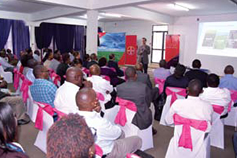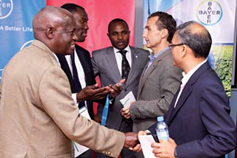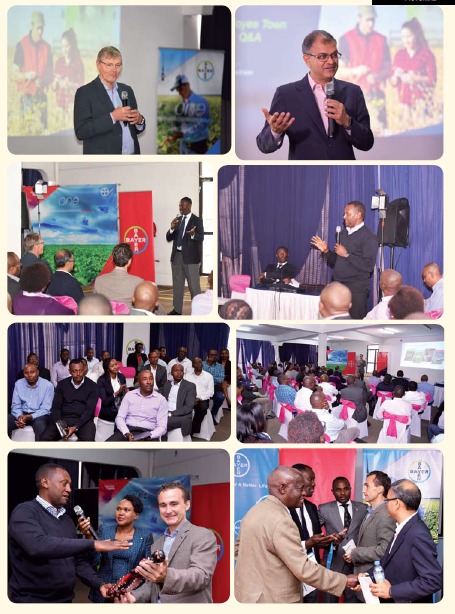Bayer Contributes Majorly to the Government’s Big Four Agenda Through Agricultural Innovation
- Bayer- Monsanto buyout beneficial towards agricultural innovation , a great boost to the government’s food security agenda.
- Approval of the BG2 cotton seed variety is an important milestone towards in reviving the manufacturing sector and creating jobs for Kenyans.
- Social Investments & community engagement key to Bayer’s Operations.
 Bayer East Africa has re-affirmed its commitment to the government’s big four agenda though their contribution to food security by ensuring innovations in agriculture –by way of employing technology combined with talent to deliver value to both customers and partners.
Bayer East Africa has re-affirmed its commitment to the government’s big four agenda though their contribution to food security by ensuring innovations in agriculture –by way of employing technology combined with talent to deliver value to both customers and partners.
Speaking during his tour of Kenya, Global Head of Agricultural Affairs and Scientific Affairs Jesus Madrazo emphasized on the company’s vision of ensuring that agriculture becomes part of the solution in an environment marred with challenges such as limited resources and the ever-changing climate.
 “We are creating leader in agriculture with a broad portifolio, and we pride ourselves in providing superior product offering and tailored solutions for our customers across the world. It is for this reason that Bayer has recently made moves such as the acquisition of Monsanto, which provides us with the more back-up as we work towards providing our customers tailored solutions for their varied needs”, said Mr. Madrazo.
“We are creating leader in agriculture with a broad portifolio, and we pride ourselves in providing superior product offering and tailored solutions for our customers across the world. It is for this reason that Bayer has recently made moves such as the acquisition of Monsanto, which provides us with the more back-up as we work towards providing our customers tailored solutions for their varied needs”, said Mr. Madrazo.
To further the food security agenda, Bayer has partnered with WEMA- a public private partnership whose aim is to improve food security and rural livelihoods of smallholder farming in Sub–Saharan Africa.
Through this partnership, Bayer and WEMA have developed maize seed hybrids that not only promise better harvest results but also have insect protection trait. The project which is led by the African Agricultural Technology Foundation (AATF) based in Kenya. The project has received funding from the Bill and Melinda Gates Foundation, the Horward G. Buffett Foundation and USAID, among others. In addition to food security, Bayer is also keen on supporting the government’s manufacturing agenda.
 Recently Bayer has notable milestones towards the commercialization of the Bollgard 2 (BG2) cotton variety; which was approved by the National Bio-safety Authority and other government bodies for National Planting Trials.
Recently Bayer has notable milestones towards the commercialization of the Bollgard 2 (BG2) cotton variety; which was approved by the National Bio-safety Authority and other government bodies for National Planting Trials.
“Manufacturing is one of the pillars of development as mapped out by the government. This background, supports our enthusiasm towards the progress we are making with the BG2 cotton seeds variety. The recent approval goes further to champion our vision to revive the textile industry in the country, as well as empower Kenyans through job creation”, Said Eric Bureau, Bayer Africa MD.
Bayer East Africa understands the value of giving back to the community around which they operate, and that is why they have endeavoured to invest in projects that are geared towards community upliftment. “Responsible corporate citizenship is at the core of our operations and that is why we have launched several programs across Africa. One of the current projects that we have running is the 5 million dollars improved Approach to Community-based Nutrition in Turkana (IMPACT) Project; whose goal is to improve nutrition outcomes for pregnant and lactating women and infants and young children ( >5 years of age). Our community development projects across the country cover water and sanitation and farming to name a few”, said Mr. Jesus Madrazo.
 Another one of Bayer’s most recent collaboration is with One Acre Fund where the company injected EUR 700,000 to go towards improving the situation of smallholder farmers in Africa and to provide better nutrition.
Another one of Bayer’s most recent collaboration is with One Acre Fund where the company injected EUR 700,000 to go towards improving the situation of smallholder farmers in Africa and to provide better nutrition.
The project addresses more than 600,000 farmers in Kenya and Rwanda who are to be provided with high-quality poultry and digital technology. The partnership is a key element in Bayer’s strategy to support social innovation and sustainable development in Africa.
Currently, Bayer has a CSR footprint in Kenya, Tanzania, Malawi, Zambia and Nigeria where they work with non- profit organizations.
